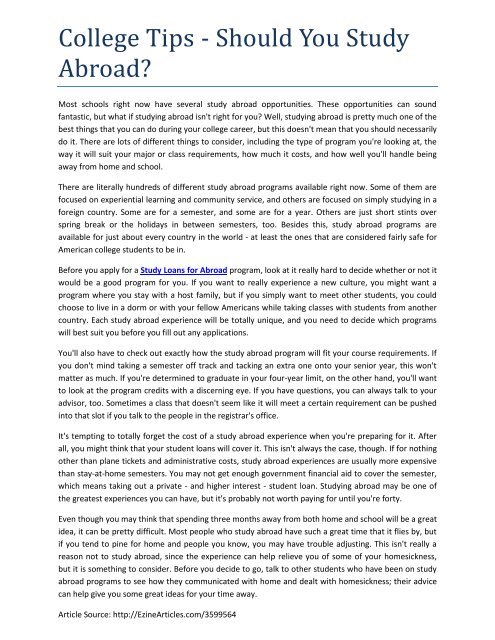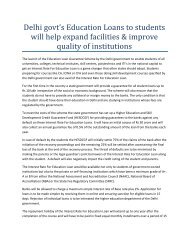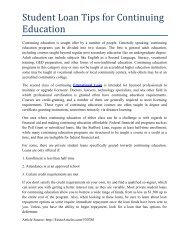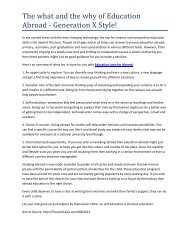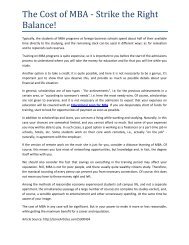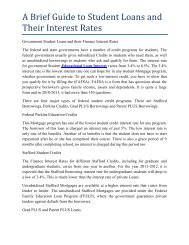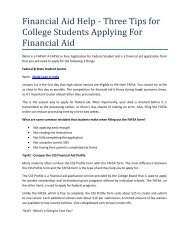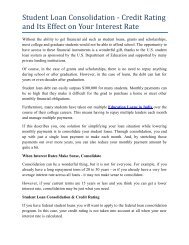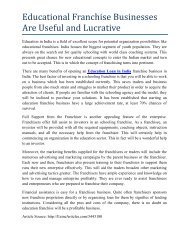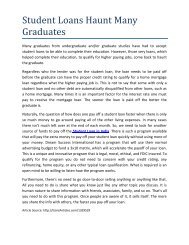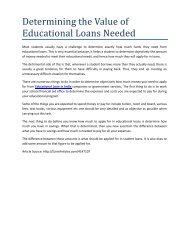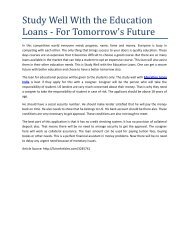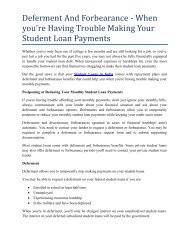College Tips - Should You Study Abroad
Your Study Loans For Abroad experience with us is guaranteed to be swift, constructive and positive. Why wait? Studying abroad is now just a click away!
Your Study Loans For Abroad experience with us is guaranteed to be swift, constructive and positive. Why wait? Studying abroad is now just a click away!
- TAGS
- abroad
- www.avanse.com
You also want an ePaper? Increase the reach of your titles
YUMPU automatically turns print PDFs into web optimized ePapers that Google loves.
<strong>College</strong> <strong>Tips</strong> - <strong>Should</strong> <strong>You</strong> <strong>Study</strong><br />
<strong>Abroad</strong>?<br />
Most schools right now have several study abroad opportunities. These opportunities can sound<br />
fantastic, but what if studying abroad isn't right for you? Well, studying abroad is pretty much one of the<br />
best things that you can do during your college career, but this doesn't mean that you should necessarily<br />
do it. There are lots of different things to consider, including the type of program you're looking at, the<br />
way it will suit your major or class requirements, how much it costs, and how well you'll handle being<br />
away from home and school.<br />
There are literally hundreds of different study abroad programs available right now. Some of them are<br />
focused on experiential learning and community service, and others are focused on simply studying in a<br />
foreign country. Some are for a semester, and some are for a year. Others are just short stints over<br />
spring break or the holidays in between semesters, too. Besides this, study abroad programs are<br />
available for just about every country in the world - at least the ones that are considered fairly safe for<br />
American college students to be in.<br />
Before you apply for a <strong>Study</strong> Loans for <strong>Abroad</strong> program, look at it really hard to decide whether or not it<br />
would be a good program for you. If you want to really experience a new culture, you might want a<br />
program where you stay with a host family, but if you simply want to meet other students, you could<br />
choose to live in a dorm or with your fellow Americans while taking classes with students from another<br />
country. Each study abroad experience will be totally unique, and you need to decide which programs<br />
will best suit you before you fill out any applications.<br />
<strong>You</strong>'ll also have to check out exactly how the study abroad program will fit your course requirements. If<br />
you don't mind taking a semester off track and tacking an extra one onto your senior year, this won't<br />
matter as much. If you're determined to graduate in your four-year limit, on the other hand, you'll want<br />
to look at the program credits with a discerning eye. If you have questions, you can always talk to your<br />
advisor, too. Sometimes a class that doesn't seem like it will meet a certain requirement can be pushed<br />
into that slot if you talk to the people in the registrar's office.<br />
It's tempting to totally forget the cost of a study abroad experience when you're preparing for it. After<br />
all, you might think that your student loans will cover it. This isn't always the case, though. If for nothing<br />
other than plane tickets and administrative costs, study abroad experiences are usually more expensive<br />
than stay-at-home semesters. <strong>You</strong> may not get enough government financial aid to cover the semester,<br />
which means taking out a private - and higher interest - student loan. <strong>Study</strong>ing abroad may be one of<br />
the greatest experiences you can have, but it's probably not worth paying for until you're forty.<br />
Even though you may think that spending three months away from both home and school will be a great<br />
idea, it can be pretty difficult. Most people who study abroad have such a great time that it flies by, but<br />
if you tend to pine for home and people you know, you may have trouble adjusting. This isn't really a<br />
reason not to study abroad, since the experience can help relieve you of some of your homesickness,<br />
but it is something to consider. Before you decide to go, talk to other students who have been on study<br />
abroad programs to see how they communicated with home and dealt with homesickness; their advice<br />
can help give you some great ideas for your time away.<br />
Article Source: http://EzineArticles.com/3599564


